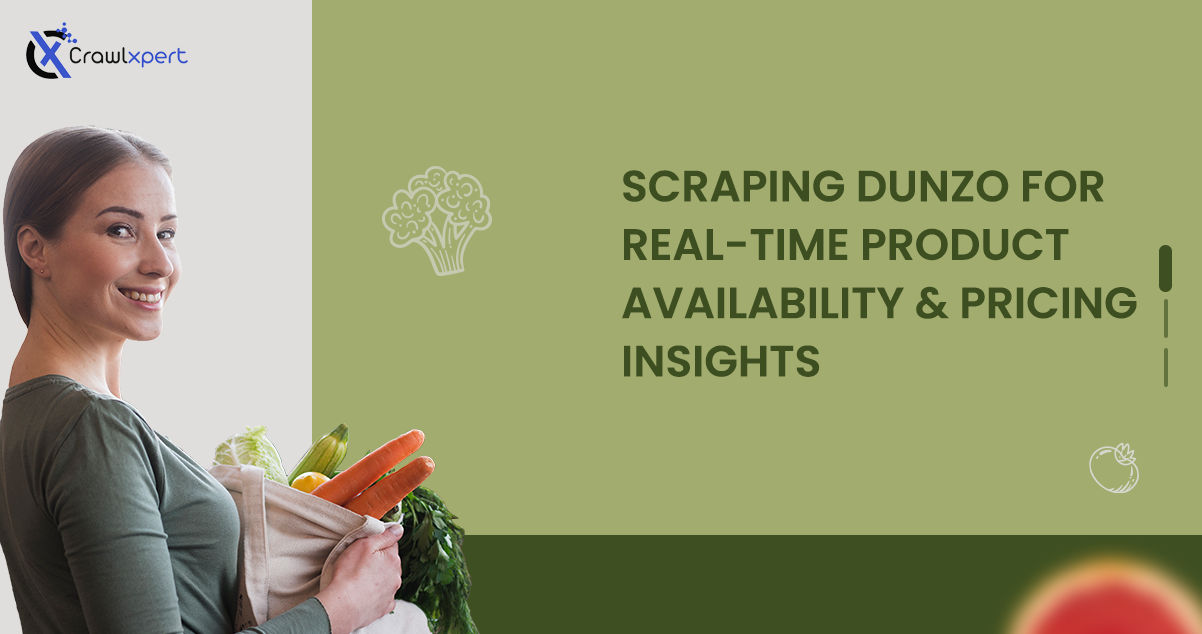
Scraping Dunzo for Real-Time Product Availability and Pricing Insights
Table of Contents
Introduction
Dunzo is an on-demand delivery service across various cities that updates product availability and pricing information in real-time across several categories from groceries, medicines, and daily essentials. Businesses and researchers can obtain a competitive edge by extracting and analyzing this data.
Key Benefit:
Scraping Dunzo's real-time data provides insights into market pricing trends, demand variation, and availability concerning warehouse stock for data-driven decision-making.
This blog will shed light on the methodology, tools, and challenges one may face while scraping Dunzo's product availability and pricing insights while adhering to ethical and legal considerations.
Understanding Dunzo's Data Structure
To effectively extract Dunzo product data, you must first understand its structure. Data is generated through both the application and web interface, displayed in real-time based on location. Key components include:
Product Listings
Each store on Dunzo provides a catalog of products with descriptions, prices, and stock availability.
Pricing Information
Prices may vary depending on location, vendor, and availability of discounts.
Stock Availability
Products frequently go out of stock, making real-time scraping crucial for accuracy.
Store Locations
Product availability differs from one store to another based on inventory.
Tools and Technologies for Scraping Dunzo Data
Several tools and technologies facilitate effective web scraping of Dunzo data:
Python
The most popular programming language for web scraping with extensive libraries.
BeautifulSoup
HTML parsing library ideal for static content extraction.
Selenium
Browser automation tool for handling dynamic JavaScript content.
Scrapy
Powerful framework for large-scale, efficient web scraping.
Important Note
Always check Dunzo's Terms of Service before scraping. Consider using their official API if available to avoid legal issues.
Methodology for Extracting Dunzo Product Data
1. Identifying Target URLs
Dunzo's URLs change dynamically based on location and store. You must analyze the request structure and identify patterns in API calls.
2. Inspecting API Requests
Most modern web applications use AJAX requests to fetch data asynchronously. Using browser developer tools (Network tab in Chrome DevTools), one can identify API endpoints returning product data.
Pro Tip:
Look for XHR requests containing JSON data when browsing Dunzo's product pages.
3. Writing a Web Scraper
A Python script using requests or Selenium can be developed to extract real-time data from Dunzo:
import requests
from bs4 import BeautifulSoup
url = "https://www.dunzo.com/{city}/store/{store_id}"
headers = {"User-Agent": "Mozilla/5.0"}
response = requests.get(url, headers=headers)
if response.status_code == 200:
soup = BeautifulSoup(response.text, 'html.parser')
products = soup.find_all('div', class_='product')
for product in products:
name = product.find('h2').text
price = product.find('span', class_='price').text
availability = 'Out of Stock' if 'out-of-stock' in product['class'] else 'In Stock'
print(f"{name} - {price} - {availability}")
else:
print("Failed to fetch data")4. Handling JavaScript-Rendered Content
Dunzo relies on JavaScript to load product details dynamically. Selenium can be used to navigate and scrape such content:
from selenium import webdriver
from selenium.webdriver.common.by import By
from selenium.webdriver.chrome.service import Service
from webdriver_manager.chrome import ChromeDriverManager
service = Service(ChromeDriverManager().install())
driver = webdriver.Chrome(service=service)
driver.get("https://www.dunzo.com")
products = driver.find_elements(By.CLASS_NAME, "product")
for product in products:
print(product.text)
driver.quit()Challenges in Web Scraping Dunzo Real-Time Data
Dynamic Content Loading
Since Dunzo loads content dynamically, static HTML scrapers may fail.
Solution: Selenium/PuppeteerIP Blocking & Rate Limiting
Dunzo may block frequent requests from the same IP.
Solution: Rotating ProxiesCAPTCHA & Bot Protection
Dunzo employs security measures to detect bots.
Solution: Headless BrowsersLegal & Ethical Concerns
Must comply with Dunzo's Terms of Service.
Solution: Use Official APIData Processing and Analysis
Once the data is extracted, it needs to be structured and analyzed for meaningful insights:
Price Comparisons
Identify pricing variations across different stores and locations.
Stock Availability Trends
Track which products frequently go out of stock.
Demand Forecasting
Predict future demand based on historical trends.
Competitor Analysis
Compare prices with other delivery platforms.
Using Python's Pandas and Matplotlib, one can analyze and visualize the data:
import pandas as pd
import matplotlib.pyplot as plt
# Sample data
data = {'Product': ['Milk', 'Bread', 'Eggs'], 'Price': [50, 30, 60]}
df = pd.DataFrame(data)
# Visualization
df.plot(kind='bar', x='Product', y='Price', legend=False)
plt.title('Product Price Comparison')
plt.show()Example Output:
Conclusion
Real-time product availability and price insights scraped from Dunzo can provide businesses with valuable market intelligence. Through web scraping, businesses can analyze product trends, observe price fluctuation patterns, and build inventory strategies.
Important Reminder:
Always conform to ethical and legal considerations and ensure compliance with Dunzo's policies when scraping their data.
For companies that want to scale their scraping operations, they can opt to use headless browsers with rotating proxies, plus AI-powered data capturing, to increase productivity while retaining accuracy. Where possible, using Dunzo's official API is the preferred approach to avoid any legal issues in data extraction.
Ready to Implement Dunzo Scraping?
CrawlXpert provides state-of-the-art scraping technology to collect, analyze, and apply data resources without the hassle of making exceptions to your business strategies.
Explore CrawlXpert Solutions
